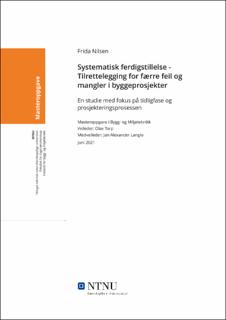| dc.contributor.advisor | Torp, Olav | |
| dc.contributor.advisor | Langlo, Jan Alexander | |
| dc.contributor.author | Nilsen, Frida | |
| dc.date.accessioned | 2021-10-12T17:19:35Z | |
| dc.date.available | 2021-10-12T17:19:35Z | |
| dc.date.issued | 2021 | |
| dc.identifier | no.ntnu:inspera:80598430:25229233 | |
| dc.identifier.uri | https://hdl.handle.net/11250/2789423 | |
| dc.description.abstract | Statistikk viser at dagens byggeprosjekter preges av en betydelig andel kvalitetsavvik. Feil og mangler oppdages ikke tidlig nok, og utbedring av disse i ettertid, utgjør en unødvendig stor kostnad i byggebransjen. Metodikken Systematisk ferdigstillelse har derfor blitt introdusert for bransjen med hensikt om å løse disse utfordringene. For å lykkes med Systematisk ferdigstillelse må det legges til rette for at metodikken ivaretas i alle faser av prosjektet, ikke kun de avsluttende.
Masteroppgavens formål er å utforske hvordan fasene før utførelsesfasen kan ivareta Systematisk ferdigstillelse. Dette er forsøkt belyst gjennom å undersøke hvordan byggherre og prosjekteringsprosessen kan ivareta Systematisk ferdigstillelse. Innenfor det gjeldende fagfelt er eksplisitt forsking på Systematisk ferdigstillelse begrenset. Derfor søker denne masteroppgaven å bidra med tanker, idéer og forslag til hvordan byggeprosjekter i større grad kan lykkes med metodikken, gitt de utfordringene som ofte følger med.
Metodologisk er det gjennomført fire kvalitative forskningsmetoder, herunder litteraturstudie, dybdeintervjuer, dokumentanalyse og casestudie. Det teoretiske grunnlaget er basert på tidligere forskning på prosjekteringsprosessen, Lean, idriftsetting og Systematisk ferdigstillelse. Casestudiet tar utgangspunkt i rehabiliteringen av Norges Handelshøyskole (NHH) og består av dokumentanalyse og syv dybdeintervjuer. Det var ønskelig å diskutere funnene fra casestudien, og derfor ble det gjennomført ytterligere tolv dybdeintervjuer med representanter fra norsk byggebransje.
Empirien som er tilegnet peker på flere av de samme utfordringene som i litteraturen. Motstand mot endring og forsinkelser på prosjekteringsleveranser blir spesielt fremhevet som sentrale utfordringer. Oppgavens funn viser blant annet at byggherre må tidlig stille en tydelig forventning om Systematisk ferdigstillelse til involverte aktører og deretter følge opp arbeidet jevnlig. Empiri og litteratur tilsier at prosjekteringsprosessen må bryte med tradisjonell prosjektering og utforske mer effektive og samhandlende arbeidsmetoder. KPI’er på punktlighet og måling av disse, er et annet tiltak empirien fremhever for å redusere forsinkelser i prosjekteringsprosessen.
Oppgaven anses ikke egnet for deskriptiv generalisering. Tidligere forskning på Systematisk ferdigstillelse er derimot begrenset, og undersøkelsen kan derfor bidra til økt kunnskap om metodikken. Spesielt kan de delene av oppgaven som belyser utfordringer knyttet til Systematisk ferdigstillelse være relevante for å gjøre prosjekter mer proaktive. | |
| dc.description.abstract | Statistics indicate that there is a material level of deviation in quality of construction projects today. Construction flaws are often not detected in the early phases, which results in material costs related to remedial actions. Systematic Completion has therefore been introduced to the construction industry with aim to find better solutions. To ensure the advantages of Systematic Completion, it is crucial that it is not only used in the final stages but employed and practiced through all phases of the project.
The purpose of the master's thesis is to examine how Systematic Completion can be employed in the early phases of a construction project, and how the construction client and the design process can facilitate the method. Within the relevant field, explicit research on Systematic Completion is limited. The master's thesis seeks to contribute with thoughts, ideas and suggestions for how construction projects can achieve a more systematic and successful commissioning process, given the challenges that often follow.
Methodologically, four qualitative research methods have been performed including literature study, semi-structured interviews, document analysis and a case study. The theoretical framework is based on previous research in the fields of Lean, Building Commissioning, Systematic Completion, and the design process. The basis of the case study is the rehabilitation of the Norwegian School of Economics (NHH); a study that consisted of document analysis and seven semi-structured interviews. Because it was desirable to confer the findings from the case study, there were conducted twelve additional semi-structured interviews with representatives from the Norwegian construction industry.
The acquired empirical data draws attention to several of the same challenges as pointed out in the literature. The main challenges are resistance to change and delays in design deliveries. The thesis show that the construction client must set a clear expectation for Systematic Completion to the parties involved at an early phase, and thereafter review the process on a regular basis. Both empirical data and literature suggest that the design process must break with traditional design and explore more efficient and interactive methods. A performance measurement system with KPIs on punctuality to reduce delays in the design process is another practice that the study highlights.
The master’s thesis is not considered suitable for descriptive generalization. However, previous research on Systematic Completion is limited, and the study can therefore contribute to increase the knowledge of the methodology. In particular, the parts of the thesis that clarify the challenges related to Systematic Completion may be useful to make projects more proactive. | |
| dc.language | nob | |
| dc.publisher | NTNU | |
| dc.title | Systematisk ferdigstillelse - Tilrettelegging for færre feil og mangler i byggeprosjekter | |
| dc.type | Master thesis | |
